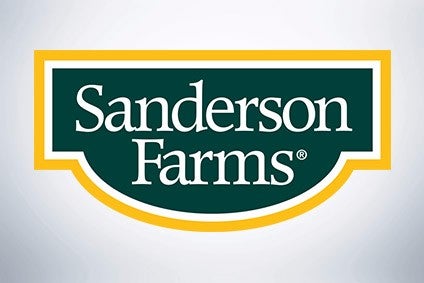
Sanderson Farms said the US poultry processor has rejected an “unsolicited” takeover proposal from New York-based investment firm Durational Capital Management.
Nasdaq-listed Sanderson said its board had “unanimously” dismissed the approach by Durational Capital, an investor focused on consumer goods, and which is a new shareholder in the business.

Discover B2B Marketing That Performs
Combine business intelligence and editorial excellence to reach engaged professionals across 36 leading media platforms.
Durational Capital had offered US$142 a share for the company, a price that “substantially undervalues Sanderson Farms and its future prospects and is significantly below the 52-week high share price of $179.45”, the poultry processor, deemed the third-largest in the US, said in a statement yesterday (29 October).
The stock closed at $126.91 on the Nasdaq exchange yesterday, up 3.4% on the day.
“After careful consideration, with the assistance of its financial and legal advisors, the board unanimously determined that the highly conditional and opportunistic proposal is not in the best interests of Sanderson Farms or its shareholders,” it added.
“The board remains committed to enhancing value for all shareholders and believes it can generate significant additional value by continuing to execute its strategic organic growth plan.”

US Tariffs are shifting - will you react or anticipate?
Don’t let policy changes catch you off guard. Stay proactive with real-time data and expert analysis.
By GlobalDataSanderson operates 13 poultry plants and processing facilities and employs more than 18,000 people.
The company’s foodservice operations, which Sanderson said in April accounted for 65% of the business, with the rest taken up by retail, has been hit hard by the pandemic. It has also suffered from Covid-19 cases at its processing facility in McComb, Mississippi.
At an investor day earlier this month, Sanderson announced it planned to increase production to better serve the retail channel as the out-of-home sector continued to be hit by a drop in foot traffic.
Reporting third-quarter results in August, chairman and CEO Joe Sanderson Jr. said “we continue to face challenging and unprecedented times, both socially and economically”, adding: “Our financial results for the third quarter of fiscal 2020 reflect extreme market volatility for products sold to foodservice customers, continued strong demand for products sold to retail grocery store customers, reduced volumes due to planned egg set reductions implemented during the early stages of the pandemic, and lower costs of feed grains.”
Sanderson’s sales for its third quarter, which ran to 31 July, were $956.5m, an increase of 1.1% on the year. However, a rise in the cost of sales meant the company’s operating income fell from $68.8m a year earlier to $39.9m. Sanderson’s third quarter net income was $32.8m, against $53.4m in the corresponding period the previous year.
In the first nine months of the group’s financial year, sales rose 2.6% to $2.62bn. The company posted a nine-month operating loss of $53.8m, versus an operating income of $100.4m in the third quarter a year earlier. Sanderson’s nine-month net income dwindled to $0.35m from $76.2m a year earlier.





